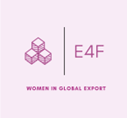Training opportunities for female-led EU businesses
E4F highlighted that EU female SMEs represent only 18% of EU exporting SMEs. This reveals a strong gender gap within Europe, considering that 62% of the jobs dependent on exports are occupied by men compared to 38% by women. This is confirmed also by seeing the special distribution of female SMEs in Europe. A survey conducted by the WEgate Platform (“A Survey of Women Entrepreneurs in Europe”, 2020) revealed the following:
“Women make up 52% of the total European population, but only 34.4% of the European Union (EU) self-employed and 30% of start-up entrepreneurs. Given their creativity, entrepreneurial capacities and talents, they are an under-utilised resource that could become the new driving force for the next generation of Europe”
The situation of female SMEs in Europe could be summarised through several key highlights, stemming from the international needs-assessment carried out by partners:
- Based on our transversal and cross-national analysis, there seems to be a lack of tailored quantitative data on the phenomenon of internationalisation for female-run businesses operating in the food, fashion and handicraft industries. With this considered, our assessment focused on second best desk research which highlight interesting insights upon export dynamics as a whole
- Training resources are indeed available at EU level, but with coefficients of granularity that seems missing the framing of internationalisation as a stand-alone capacity building’s field
- Although gender-centred statistics on EU SMEs are largely available, when it comes to export and internationalisation the analysis of the phenomenon loose a diversification of such scale
The research concluded by partners, and results stemming from the evaluation, confirmed the existence of several training areas that could indeed function as triggers for new development pathways based on international competitiveness, growth and profitability through the penetration of foreign markets.
Four main training areas gathers together the training modules developed by partners:
- Strategies for Internationalisation
- Market Research/market analysis
- Risk Analysis
- Business Plan for Internationalisation
- Customs, International IPR, legal aspects
- E-commerce, international and digital marketing
- International digital marketing: strategies and tools
- Business models in International digital marketing IWS
- Social selling
- Branding and Personal branding
- Digital Story Telling
- Sociologic and cultural aspects of Extra EU Export
- Cross cultural management
- Business etiquette in an international environment
All training material will be available for free, in open access and Multilanguage version via the official Open Education Resource Platform of the project: www.e4f-network.eu



Comments are closed